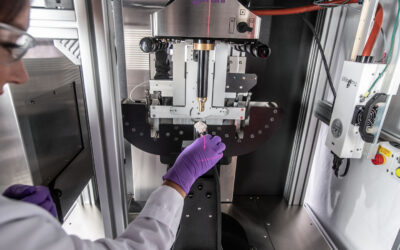Resistance to radiotherapy in glioblastoma (GBM) is an important clinical problem and several authors have attributed this to a subpopulation of GBM cancer stem cells (CSCs) which may be responsible for tumour recurrence following treatment. It is hypothesised that GBM CSCs exhibit upregulated DNA damage responses and are resistant to radiation but the current literature is conflicting. We investigated radioresistance of primary GBM cells grown in stem cell conditions (CSC) compared to paired differentiated tumour cell populations and explored the radiosensitising effects of the ATM inhibitor KU-55933. We report that GBM CSCs are radioresistant compared to paired differentiated tumour cells as measured by clonogenic assay. GBM CSC’s display upregulated phosphorylated DNA damage response proteins and enhanced activation of the G2/M checkpoint following irradiation and repair DNA double strand breaks (DSBs) more efficiently than their differentiated tumour cell counterparts following radiation. Inhibition of ATM kinase by KU-55933 produced potent radiosensitisation of GBM CSCs (sensitiser enhancement ratios 2.6-3.5) and effectively abrogated the enhanced DSB repair proficiency observed in GBM CSCs at 24 h post irradiation. G2/M checkpoint activation was reduced but not abolished by KU-55933 in GBM CSCs. ATM kinase inhibition overcomes radioresistance of GBM CSCs and, in combination with conventional therapy, has potential to improve outcomes for patients with GBM.
Ross Carruthers, Shafiq U Ahmed, Karen Strathdee, Natividad Gomez-Roman, Evelyn Amoah-Buahin, Colin Watts and Anthony J Chalmers
Download Paper
Xstrahl to Highlight Superficial and Orthovoltage Radiotherapy Solutions for Skin Cancer and Selective Benign Conditions at AAPM 2024
Xstrahl, a global leader in the delivery of superficial radiation therapy devices and preclinical radiation research systems, will demonstrate Xstrahl 200, a modern orthovoltage radiotherapy solution for treating superficial lesions, skin cancers, and selective benign conditions at the 66th Annual Meeting & Exhibition of the American Association of Physicists in Medicine (AAPM) in Los Angeles, CA, from July 21-25, 2024, at booth 518.






